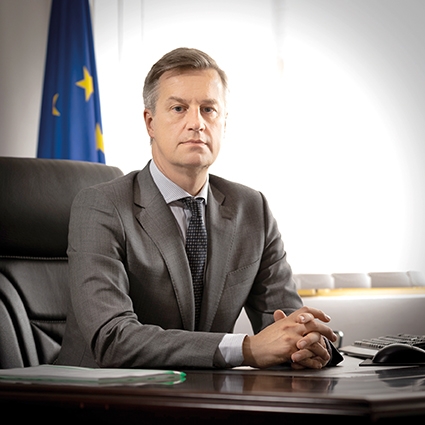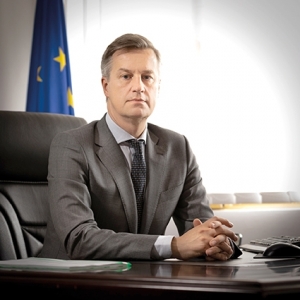The EUMM in Georgia: the Pen is Our Weapon
Exclusive Interview
In August 2008, an Iron Curtain split Georgia after it lost the war against Russia. As a result of its defeat, Georgia lost control over Abkhazia and Tsinkhvali regions and barbed-wire delineated new “borders.” People were forced to flee, among them 18,700 ethnic Georgians from “South Ossetia.” However, for years, security and stability have been gaining ground in these areas thanks to the European Union Monitoring Mission (EUMM) which has been actively patrolling day and night along the Administrative Boundary Line (ABL) since 2008. For the 10th anniversary of the August 2008 War, GEORGIA TODAY met with Erik Høeg, the head of the Mission.
Erik Høeg, a Danish career diplomat, has been working in Georgia for three years, first as Deputy Head of EUMM Georgia, then, since 2017, as Head of the Mission.
Can you briefly define the EUMM and its mission?
The European Union Monitoring Mission in Georgia (EUMM) is an unarmed civilian monitoring mission established by the European Union in 2008. Our key task is to ensure stability and security, not least in the areas adjacent to the so-called Administrative Boundary Lines of the breakaway regions of Abkhazia and South Ossetia. We work to avoid any return to hostilities. We are facilitating the resumption of a safe and normal life for local people, the men, women and children most affected by the aftermath of the war. The Mission makes a difference by observing the situation, reporting incidents and contributing with accurate information and updates that serve policymakers. We don’t have an executive mandate so it is through our observation s, our reporting and by building communication channels between security actors on both sides that we contribute to peace.
What about the structure?
Today, we have more than 320 people, one third of whom are Georgian nationals, working in support of peace and security. We have colleagues from 23 EU member states (to be 25 in the coming months) of various backgrounds. As a rule, about one third have a military background, one third are policemen, and one third are from other civilian professions. Fortunately, we receive many applications and can select qualified staff. This shows that EU countries are committed to regional stability and also that the Mission is seen as a good place to work. Much of our work is patrolling. We have three kinds of teams in the field offices that work on behalf of the EUMM: the ABL Team, the Human Security Team which deals with the social, economic and the human rights situation, and the Compliance Team which monitors military and police activities. We try to be as close as possible to the ABL to be able to observe and react quickly if something happens. Therefore, the EU Monitoring Mission has its headquarters in Tbilisi, and offices in Zugdidi, Gori and Mtskheta. All in all, the EU invests €20.000.000 per year in our budget for regional security.
Who are your collaborators and what projects do you have in the pipeline?
We work with all security actors in the part of Georgia under central government control and those active in the breakaways - Georgia, Russia, and with the de facto authorities. Overall, communication and response are efficient through the established mechanisms.
What are the main challenges you face?
There is no doubt that the most penalizing aspect of the work we do is the restrictions imposed on our movement across the ABL. Unfortunately, we do not have access to the breakaway regions, which limits our field of work. We compensate by using technology.
Security can also be a challenge. We have to make sure our staff are safe and we take measures to ensure they are properly updated, equipped and trained.
On some occasions, it can also be a challenge that not everybody understands our mandate. That can create frustration among people who expect more. We are a monitoring mission and cannot carry out development projects ourselves to help people at the ABLs. But we can, and do, provide information to other civil society organizations and donors, helping them to target their projects.
What would you say to people who think the EUMM is “useless”?
Good question. I’d say it’s fair to doubt, but take a step back, look at the ABL and ask yourself what the situation would have been like 10 years after the war if there had not been 200 EU monitors on the ground. Ask yourself if there might have been uncontrolled incidents or an escalation in violence, or further restrictions to people’s rights. Stability does not appear automatically, it needs effort. And we have been a key part in the international effort to maintain that stability during the last decade.
By Antoine Dewaest












